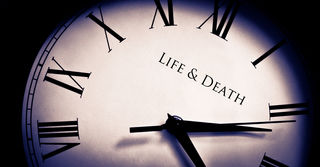Fear
Facts to Calm Your Fear of Death and Dying
You may already have endured things as physically hard as, or worse than, dying.
Updated May 29, 2024 Reviewed by Lybi Ma
Key points
- Many of people's worst fears about death are not realistic and based more on how they imagine death to be.
- There is no reason to believe the intensity of the pain of death will be any worse than that experienced.
- When someone dies, they have no conscious awareness of the actual event.

Woody Allen famously quipped, “I’m not afraid of death; I just don’t want to be there when it happens.”
There are many rational things to worry about when we contemplate our own death—perhaps foremost among those is the concern about how our surviving loved ones will cope emotionally and materially without us. But many of our worst fears about death are less realistic and based more on how we imagine death to be. This post is about those unfounded fears.
In modern Western society, most people have little direct experience of death, and we don’t like to talk about the subject. Our society is organized in such a way that the dead are quickly removed from us, and those traditions that do encourage viewing the dead do so only after careful cosmetic preparation by specialized morticians, often resulting in the dead looking more like an elegant wax model replica of the living person. Attendance of children at funerals and cemeteries is generally not encouraged, adding to the sense of dreaded unfamiliarity with death with which many of us grow up.
Fear of pain
There’s no reason to expect that the actual process of dying is any worse physically than what you or other still-living people have already previously experienced.
For most people, the terror of the actual process of dying probably involves a fear of physical pain. It also probably involves fearful incomprehension of the seemingly mysterious process by which the consciousness that is our "self" is extinguished, or fades away.
Let's deal first with our fear of a painful death. We are all afraid of pain. We have all had much experience of physical pain, some more than others, and we are quite likely to have witnessed more extreme pain and agony in others than we have experienced ourselves. All this makes us fear pain. Physical pain arises from damage to our living tissue. Since death is the ultimate destruction of our living tissues, we naturally assume that death must be the ultimately painful experience. Since nobody who has actually died can tell us what it felt like physically, we naturally have a terror of dying.
But in fact, rationally and from a medical point of view, there is no particular reason to suppose that the intensity of pain (or other forms of discomfort or impairment) from various causes of death is greater than the intensity of pain from various illnesses and injuries that we ourselves may already have previously experienced, or the pain that others have experienced and survived to tell the tale. Furthermore, dying in and of itself does not necessarily involve painful processes—some forms of death are painful and others are not. And many acute injuries are actually more painful afterward (in people who survive them) than they are at the moment of injury.
However, not to sugar-coat this subject—certainly many of the people who have survived more extreme forms of agonizing injury or illness would never want to re-experience it, and some are psychologically traumatized by the experience for a long time afterward (bear with me—we are talking just for a moment about worst-case scenarios). There's every reason to expect that the pain and suffering are just as bad if not worse for those who survived such injury or illness than those who died. Yet even the most traumatized survivors have in very many cases gone on to live fulfilling lives and are able to talk about the experience.
So, while we certainly wish to never experience such a thing, even in the worst of our nightmarish death scenarios the actual pain in and of itself is something that can certainly be endured and survived, as shown by our fellow human beings. The extent of the human capacity to endure suffering is often very surprising. And what we have just spoken about are the most extreme cases of pain and suffering, not the more common scenarios.
Cessation of consciousness1
What about the process by which our self-aware consciousness and the entirety of our subjective experience abruptly ends? Since death, from a biological point of view, entails a complete and utter extinguishing of consciousness, being dead will not feel like anything—no more so than you felt, say, a year before you were born. There simply will be no you to do the feeling (It can be hard for us egotistical creatures to imagine that the world exists independently of whether we ourselves exist to experience it).
As evolutionary psychologist Jesse Bering reminds us, “Consider the rather startling fact that you will never know you have died. You may feel yourself slipping away, but it isn’t as though there will be a ‘you’ around who is capable of ascertaining that, once all is said and done, it has actually happened."2 This point was made some 2,300 years ago by the Greek philosopher Epicurus, who wrote: “Why fear death when we can never perceive it?”3 The Roman Epicurean philosopher Lucretius later pointed out that our state of non-existence for the eternity of time after our death is the same state as for the eternity of time before our birth.
Apart from the nightly experience of falling asleep (especially deep, dreamless sleep), the actual process of losing consciousness due to injury or illness, as well as induced by anesthesia4, whether sudden or gradual, is an experience that many of us have had. There is no reason to think that the experience of temporarily losing consciousness is any different from the experience of permanently losing consciousness, in terms of how the actual process of slipping away feels.
People may feel themselves losing consciousness, only if it is gradual, but nobody actually experiences unconsciousness itself, unless they are in a light state of unconsciousness with partial awareness, or dreaming. Indeed, people who have been resuscitated after technically being dead for a few minutes do not describe the experience of how it felt as they were losing consciousness any differently compared with those who lost consciousness from other, transient causes. And why should they?
So our sense that the process of dying is something completely alien from any living human’s experience is actually mistaken. We have a pretty good sense of what dying feels like, either from our own first-hand experience or from the accounts of others (accounts of living people, no need for a séance! No magical beliefs are required in this exercise of reality-checking reassurance). And once one has actually died, being dead doesn’t feel like anything whatsoever, obviously. There’s simply no you to do the feeling.
Grabbing life by the horns
Awareness of our mortality can be a profound challenge to our self-image of being an all-important, indispensable, independent entity in the universe. Or it can fill us with a sense of the preciousness and fragility of this opportunity, the value of a life. It can inspire us and motivate us to live life to the fullest, with a sense that we should not waste our days—to experience, to learn, to grow, to connect, and to contribute to those around us and those who will follow us.
Or, as the psychiatrist Irvin Yalom put it, in Staring at the Sun: Overcoming the Terror of Death: “The way to value life, the way to feel compassion for others, the way to love anything with greatest depth is to be aware that these experiences are destined to be lost."5
Our mortality and finitude remind us of the urgency of living here and now, with full engagement in life and with dedication to those around us. When death comes for us, let it find us among the living.6
References
1. Parts of this article are taken from: Ralph Lewis, Finding Purpose in a Godless World: Why We Care Even If The Universe Doesn’t (Amherst, NY: Prometheus Books, 2018).
Finding Purpose in a Godless World addresses, among other things, how consciousness is a transient phenomenon in complexly evolved living creatures, how mind emerges from mindless matter, and why our human intuition stubbornly insists that consciousness is some sort of mysterious, ghost-like, immortal phenomenon—why it's so hard for us to accept that our mind / personhood / self is purely the product of our finite physical brain. The book is about how cutting edge science shows that consciousness, human purpose and caring, like absolutely everything else in existence, could have emerged and evolved unguided, bottom-up, in a spontaneous and purely physical universe. The book also provides an empathetic psychological and philosophical understanding of how people cope with death and dying as well as other forms of adversity in a fundamentally random, unguided universe without relying on supernatural belief.
See this YouTube video link for an engaging Power Point presentation in which Dr. Lewis explains how a family health crisis focused him on coming to terms with the outsized role of randomness in life, and to wrestle with the question of whether the scientific worldview of a fundamentally random universe is nihilistic. He summarizes how science has come to view the universe and absolutely everything in it as the product of entirely spontaneous, unguided processes, and why this is a highly motivating realization for humankind. Or see this link for a very brief video providing a synopsis of the book.
2. Jesse Bering, "The End? Why so many of us think our minds continue on after we die," Scientific American Mind, October/November 2008, 34-41. Perhaps the most startling fact is that we actually need Bering to point out to us something that is as obvious as this… I am repeatedly taken aback by how often an intelligent adult patient of mine tells me that they have been lying awake at night worrying about “what it will feel like to be dead,” or fearing the experience of being buried after they have died...
3. Quoted by Irvin D. Yalom, Staring at the Sun: Overcoming the Terror of Death (San Francisco: Jossey-Bass, 2008), p. 81. These ideas were further elaborated beautifully by the Roman Epicurean philosopher-poet Lucretius in the first century BCE, in his great poem “De rerum natura” (“On the Nature of Things”)
[CLICK 'MORE' TO VIEW FOOTNOTES 4-6, INCLUDING AN IMPORTANT POINT FOR PEOPLE WHO ARE SUFFERING FROM DEPRESSION AND FEELING SUICIDAL]
4. Deep anesthesia might perhaps be more similar to death than it is to sleep, in terms of the mechanisms of consciousness and its cessation. See for example Linda Geddes, "Banishing consciousness: the mystery of anaesthesia," New Scientist, no. 2840 (November 23, 2011): 48-51. And in countries like Canada, where (carefully regulated) euthanasia is available, the experience of dying can be practically identical to anesthesia—gentle and swift.
5. Yalom, Staring at the Sun: Overcoming the Terror of Death, p. 147.
6. In case you are someone suffering from depression, and just in case your depression leads you to misinterpret anything said here to somehow reinforce any suicidal thoughts you may be experiencing, please note one of the most important points about depression and suicidality: in the vast majority of cases it is a temporary and distorted state of mind. People change their minds and look back in puzzlement at how they once felt that way: See https://www.scientificamerican.com/article/why-do-people-kill-themselves/ So, if you are suffering from depression and feeling suicidal, please seek help—tell a family member or friend, or talk to your doctor, or call a distress helpline, such as the National Suicide Prevention Lifeline at 1-800-273-8255 in the United States. And don't act on the thoughts—wait it out.




